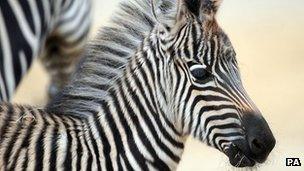Circuses to face wild animal ban
- Published

Zebras are among the animals working in travelling circuses in England
Circuses in England will be prohibited from using wild animals in their shows from the beginning of December 2015, the government has announced.
Ministers were initially reluctant to bring in a blanket ban - demanded by many MPs and campaigners - in case of legal action by operators.
Agriculture minister David Heath said the two-year "grace period" would allow circus owners to arrange suitable care.
There are currently 20 licensed wild animals working in circuses.
These include camels, zebras and snakes, but not elephants, monkeys, gorillas, chimpanzees or big cats.
'Common sense'
Under the terms of the draft Wild Animals in Circuses Bill, the ban will cover any creature not normally domesticated in Britain.
The government has already introduced licensing regulations to improve conditions for performing animals until the law is changed.
Conservative MP Mark Pritchard, whose backbench motion in 2011 calling for a ban was passed without a vote in the Commons, said: "I am delighted the government have finally decided to introduce a ban.
"This is a victory for animal welfare and common sense - and proves that politicians who have belief, stick to their principles, and persevere despite hostile opposition, can still shape events."
In a joint statement, the Born Free Foundation, the British Veterinary Association, the Captive Animals' Protection Society and the RSPCA said: "We are pleased to see that the government appear to have come good on their promise to ban the outdated practice of using wild animals in circuses.
"We have long argued that the complex needs of wild animals cannot be met in a travelling circus environment and were disappointed when the government introduced a licensing regime earlier this year which appeared to legitimise a practice which we, and our hundreds of thousands of supporters, want to see abolished altogether.
"We are looking forward to seeing the ban fully implemented at the earliest opportunity."
- Published16 April 2013
- Published24 June 2011
- Published14 June 2011
- Published7 June 2011
- Published22 May 2011
- Published19 May 2011